The Return of IRL Apps
We spoke with the LA Chess Club's founder and two IRL-focused speedrun startups. Plus, Quora's Adam D'Angelo on how to make products that reach a billion users.
When COVID-19 first swept the world and sent life indoors, Michelle Kong decided to get into Chess. Really into it. “I was playing 16 hours a day,” Kong says. “I was obsessed.”
For the 27-year-old from Los Angeles, chess was a refuge, and a way to stay connected to the outside world. Kong began building a small audience by live-streaming her games on TikTok. When things opened back up, she desperately wanted to find people to play with in person, but found that traditional chess clubs didn’t suit her. “It was all older men and young boys,” she says.
“I wanted a chess club for people like me—so I started one myself.”
The LA Chess Club is a wildly unique live event format that combines over-the-board chess matches with live music and speed dating events. The club’s meetups regularly host as many as 500 people, 70% of whom are new to chess, according to surveys Kong has run.


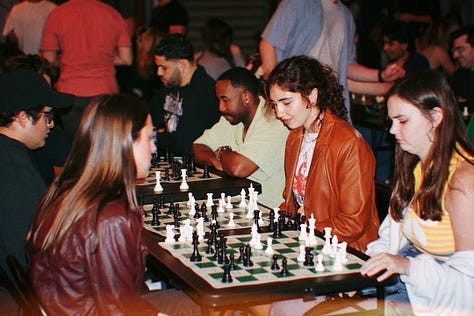
At LA Chess Club events, Kong roams the floor snapping pics and playing matchmaker for competitors. “It’s structured as arena chess, so you don’t get to pick who you play against,” she says. “It’s two people, and you're sitting across from each other, so it's rather intimate—but you’re here to socialize, so once you’re done, it’s like: next."
As the popularity of the club’s events has grown, Kong has had to find larger and larger venues. Before organizing the LA Chess Club, she says, “I had no idea how to organize events. I had no idea how to do marketing. Never even took pictures.”
And yet the retro-casual photos Kong uploads to the LA Chess Club Instagram are undeniably a big part of what attracts young, cool, chess-curious people to Kong’s events.

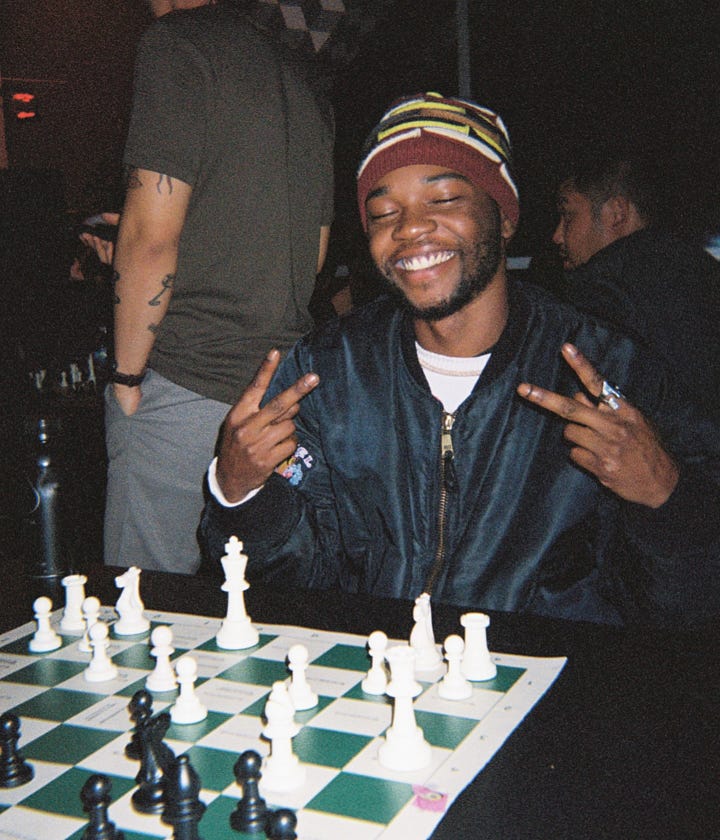
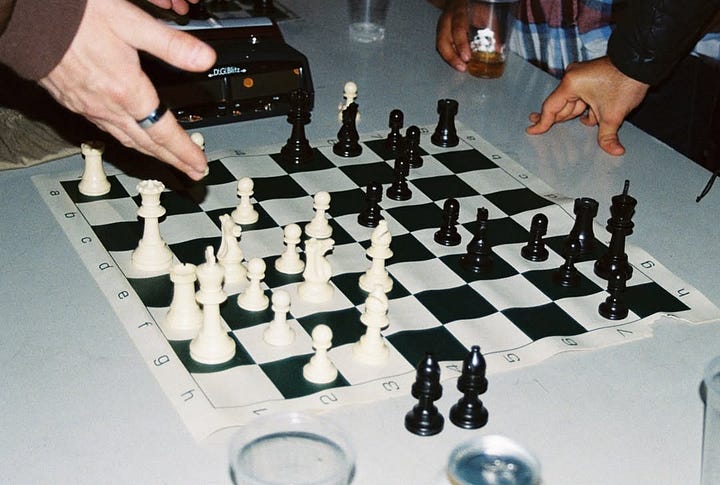

Soon, Kong says, she’s planning on launching an app to help others launch their own chess clubs. “That’s what people want: someone to organize the event, and to match people up so they don’t have to feel awkward.”
As the second half of the 2020s begins, people are more desperate than ever for a way to connect IRL. And, as the burden of swiping right on dating apps has lost its luster, many are open to new formats for socializing and matching up with others.
So what might the future of IRL apps look like?
Two startups in the latest class of a16z speedrun have some ideas.
Don’t Sweat Making Friends
How do you make new friends, especially when you’re in a new place?
It’s a problem many of us have faced when moving to a new city or state. The problem is even more pressing if you’re moving to a new country.
SweatPals1 co-founder Salar Shahini moved to the United States from Iran in 2012, and found it difficult to connect with people. “Everyone said to go to a bar, or go to a nightclub, but those were very uncomfortable environments for me to meet anyone in,” Shahini says.
Instead, Shahini found community through sports, starting with a rock climbing group he joined. Having a shared fitness goal with others, he points out, gives people a reason to collaborate more freely and let their guard down a bit. And whereas going to a bar can feel like a waste of time if you fail to meet someone, sports are different: “You’re getting something out of it even if you don't end up having a good social experience.”
The experience stuck with Shahini, and after selling a company a few years ago, he began to muse about the possibility of creating an app to help people find group fitness activities more easily. “I couldn't stop thinking about it when I moved to Austin,” he says. “Why is there no dedicated platform for this?”
Like Salar Shahini, SweatPals co-founder Mandi Zhou struggled to make friends when she moved to the United States from China as a high school freshman. Zhou spoke no English, and in part due to the stress of the transition, she developed a severe psoriasis. “I even had some like on my face and I was freaking out because it was already really hard for me to blend in. I didn't speak the language and now I look super different than anyone else.”
She tried creams and herbal remedies, but found that the only reliable fix for the skin condition was a combination of sweating and sunlight. “So I joined all the sports clubs I could,” Zhou says. “Basketball, volleyball, lacrosse, tennis, and every day after school you're gonna see me running around on those courts. It was something I could do without speaking English too. That was the best experience I’d had since I came to America.”
When Shahini approached Zhou with his idea for a fitness app, it instantly appealed to her. Zhou and Shahini launched SweatPals in 2022, and since then it’s grown to over 200,000 active users, most of whom are active in just five cities where the app has officially launched. In Austin, Texas, Shahini says, one in 10 people between the ages of 20 to 34 have used the app. At least one SweatPals user has said she moved to Austin specifically because of the community she met through the app.
For users, the app is a simple way to sign up for events and chat with other attendees. For event hosts, it’s a full-stack management platform that automates messaging, memberships, and even the gathering of liability waivers.
Shahini says that the use-cases the app attracts differs by city. “In Miami, for instance, wellness is the biggest category we see, like yoga and sound baths. And then Austin is more about group experiences, like pickleball and running.” Los Angeles, he says, is more open to interesting fusions of experiences, “like puppy yoga.”
That assessment might ring a bell for anyone attending a chess + speed dating event this week in LA.
Making Money and Organizing the Fun
One consistent theme you’ll hear from younger founders is that the previous generation of events management apps don’t work well for Gen Z users.
Kieran Van Vuuren says he and his team created the Plots2 app in part because they were dissatisfied with the process of organizing events using Instagram. It worked well enough for getting the word out about a party, but not for handling payments or tickets. “That part was kind of a pain,” Van Vuuren says. “We didn't even realize that Eventbrite existed.”
The first version of the Plots website was “a really shitty MVP,” Van Vuuren says, “really just a way to press RSVP.” But inspiration struck after the team added a comments feature that event attendees used to connect both before and after the event. Van Vuuren and his cofounders released Plots as an app and have since gotten traction, particularly with recurring hosts who run paid events as a business. “Last year we helped hosts make over $4 million,” Van Vuuren says.
Part of the thesis for Plots is that there’s a massive unserved opportunity for people that want to make money hosting events. But aside from professional promoters, there are more casual use-cases as well. “Some friend groups also just have that one person who loves to plan things, right?” Van Vuuren says.
“Some people get really invested in making their lives and their friends' lives a little bit more fun. That’s who uses our app.”
The Future of Events?
For founders working on live event apps, the vision is for a future where more people are empowered to organize and make money on live events.
“We want to unlock a new career opportunity with social fitness experiences,” says Mandi Zhou of SweatPals. “Now you don't have to be a fitness professional or a coach to be able to run events, or take tickets and monetize them. Now it's everyday people, you and me, who can start something.”
Quora founder Adam D’Angelo on how to make things that reach a billion users
Speaking in front of a live audience of a16z speedrun founders, our own Andrew Lee asked Quora founder Adam D’Angelo what lessons he’s learned about building products that reach a billion users. D’Angelo’s response is worth watching in full:
“The same exact dynamic that gets you from a million users to 10 million is what’s going to get you from 10 million to 100 million and 100 million to a billion… when you’re getting up to a thousand [users] you can do things like email all your friends. But to get from even 10 thousand to 100 thousand you can’t rely on favors. You can’t really do that much with unscalable marketing. And so you’ve got to get your product to a state where it just naturally grows.”
—Quora founder Adam D’Angelo
💡 More Big Ideas
🤖 In a new essay called Revenge of the GPT Wrappers: Defensibility in a world of commoditized AI models, Andrew Chen argues that “network effects and distribution will be king, once more.”
🧅 Robin Guo asked Twilio’s Jeff Lawson why he bought The Onion. Lawson shared how the beloved satirical publication was almost killed: “Private equity gutted it. Ads choked it. The internet’s soul-crushing clickbait nearly killed it.”
💼 There are currently over 400 open jobs listings across our portfolios. Join our talent network for more opportunities. If we see a fit for you, we'll intro you to relevant founders in the portfolio.
That’s it for this week. If you haven’t already subscribed, it’s time to lock in. We’ll see you next Tuesday.
You are receiving this newsletter since you opted in earlier; if you would like to opt out of future newsletters, you can unsubscribe immediately.
This newsletter is provided for informational purposes only, and should not be relied upon as legal, business, investment, or tax advice. You should consult your own advisers as to those matters. This newsletter may link to other websites and certain information contained herein has been obtained from third-party sources. While taken from sources believed to be reliable, a16z has not independently verified such information and makes no representations about the enduring accuracy of the information or its appropriateness for a given situation.
References to any companies, securities, or digital assets are for illustrative purposes only and do not constitute an investment recommendation or offer to provide investment advisory services. Any references to companies are for illustrative purposes only; please see a16z.com/investments. Furthermore, this content is not directed at nor intended for use by any investors or prospective investors, and may not under any circumstances be relied upon when making a decision to invest in any fund managed by a16z. (An offering to invest in an a16z fund will be made only by the private placement memorandum, subscription agreement, and other relevant documentation of any such fund which should be read in their entirety.) Past performance is not indicative of future results.
Charts and graphs provided within are for informational purposes solely and should not be relied upon when making any investment decision. Content in this newsletter speaks only as of the date indicated. Any projections, estimates, forecasts, targets, prospects and/or opinions expressed in these materials are subject to change without notice and may differ or be contrary to opinions expressed by others. Please see a16z.com/disclosures for additional important details.
SweatPals is an a16z speedrun portfolio company
Plots is an a16z speedrun portfolio company



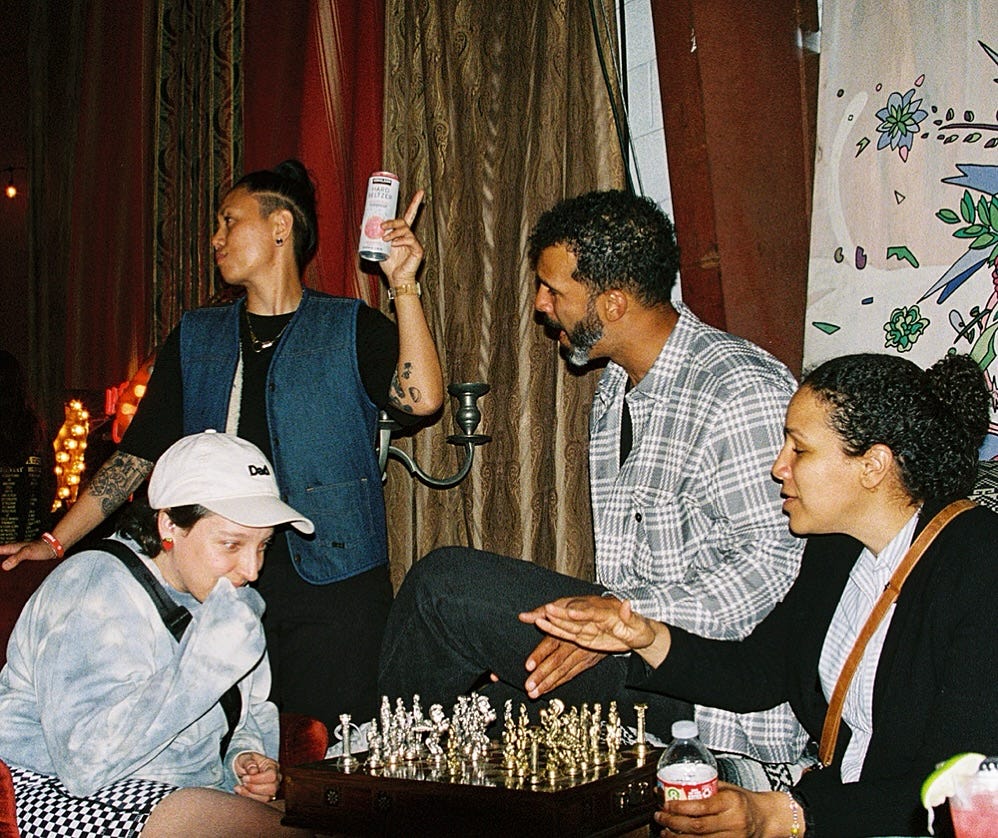
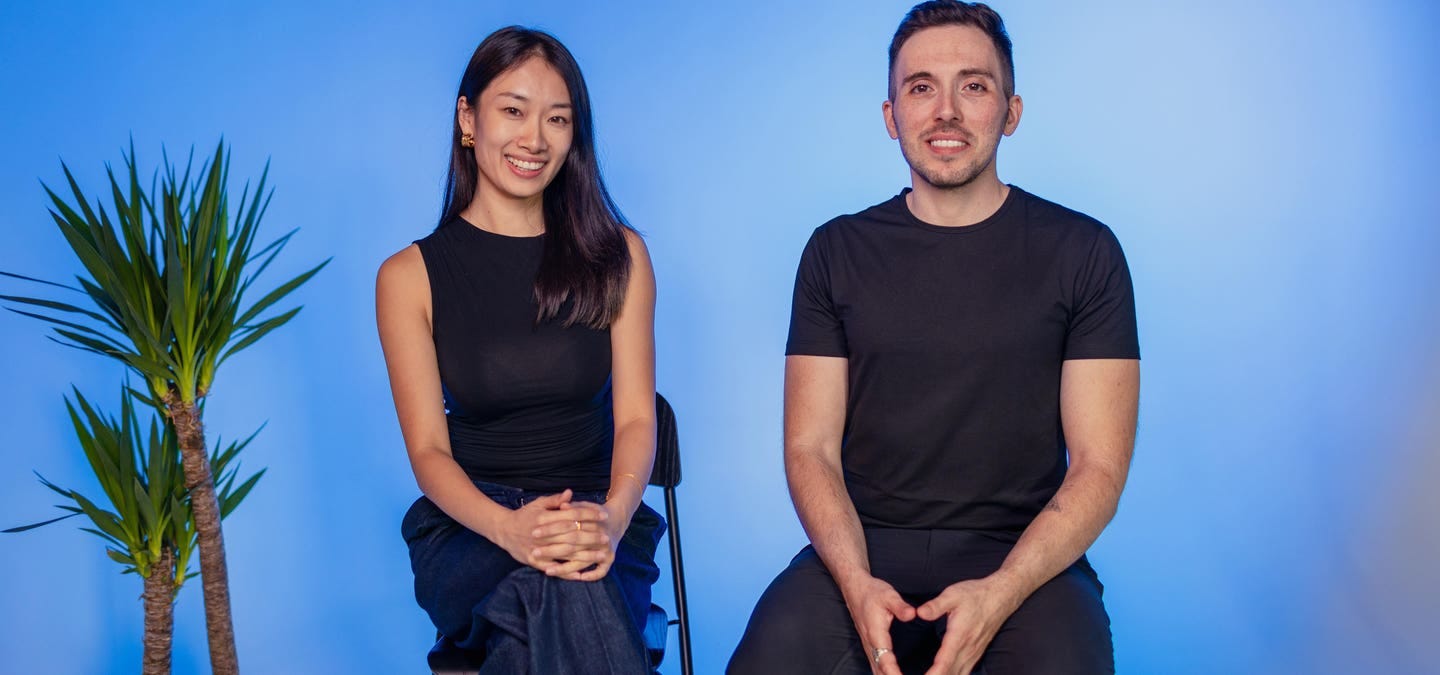
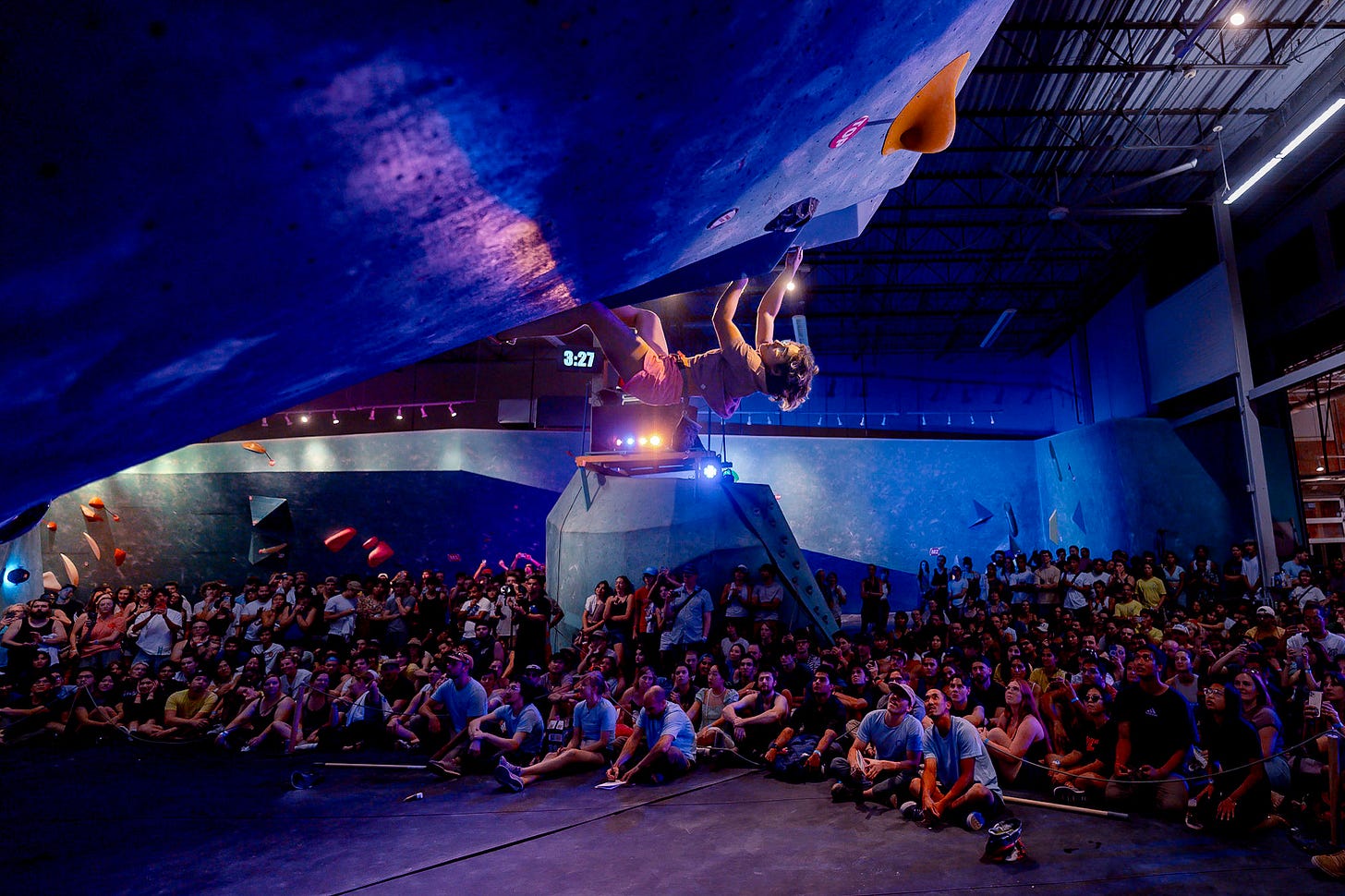
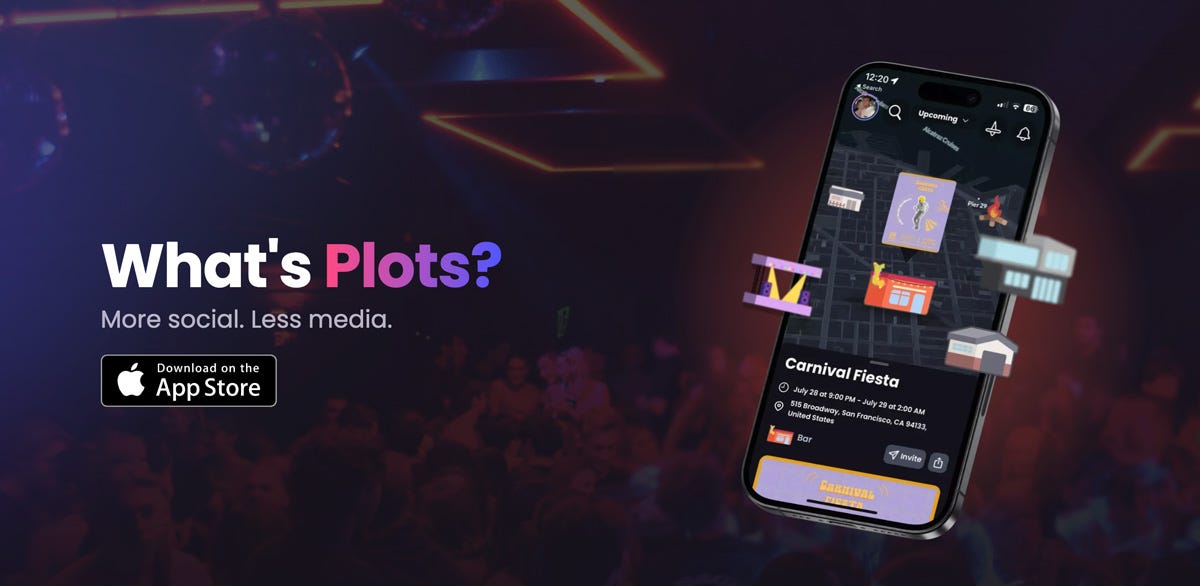

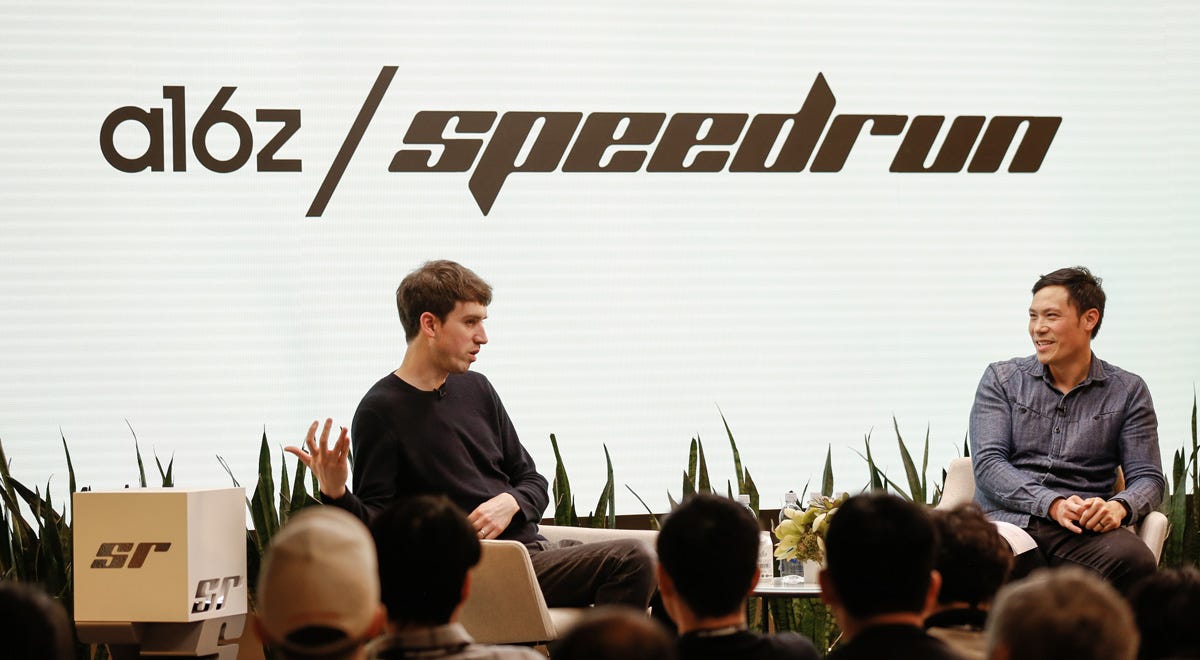


I love reading about Michelle's story! Thanks for sharing it!
It's awesome that live events are getting the infra they desperately need.